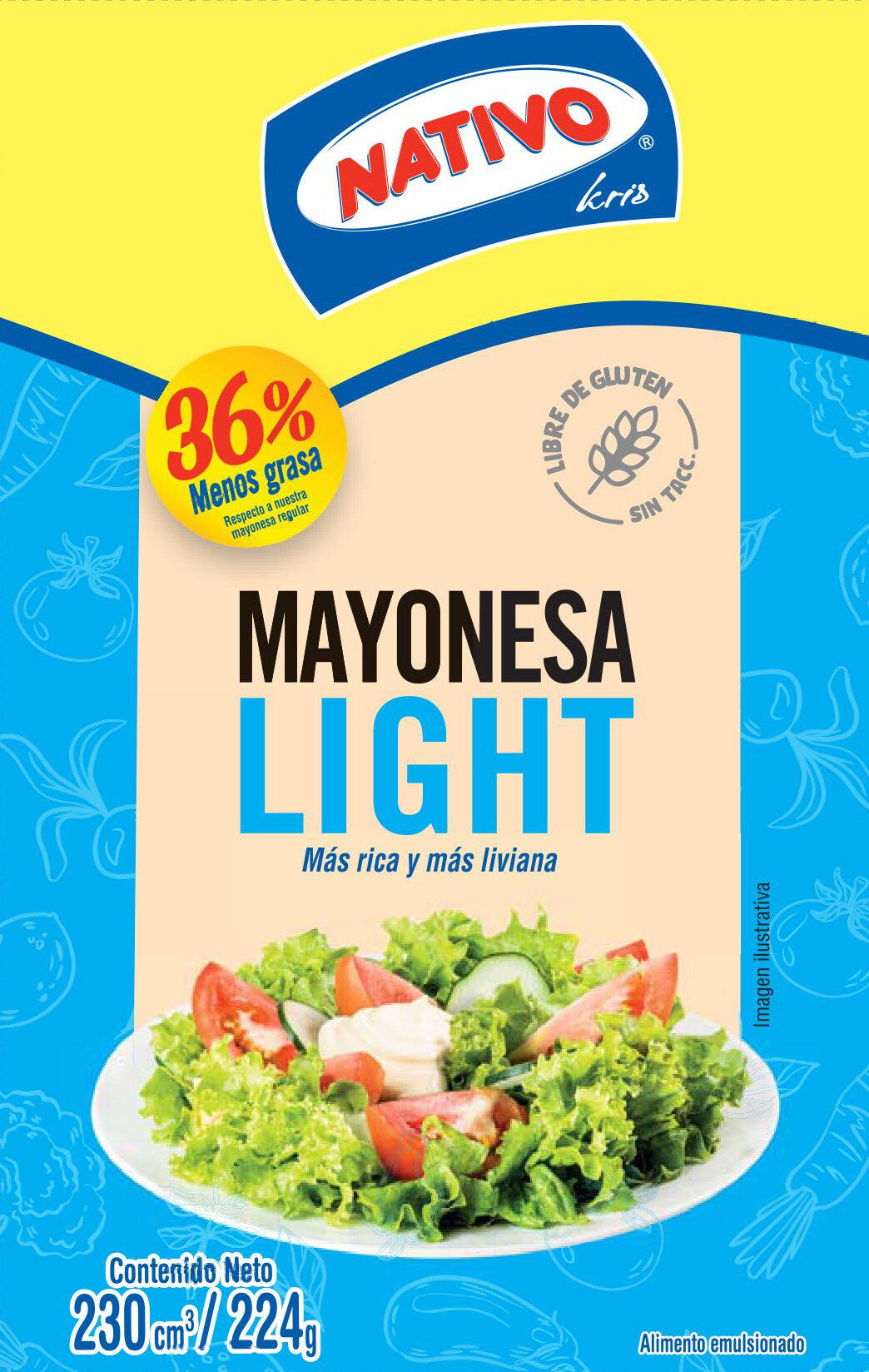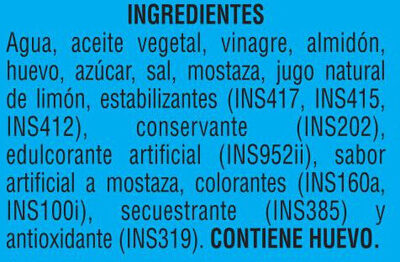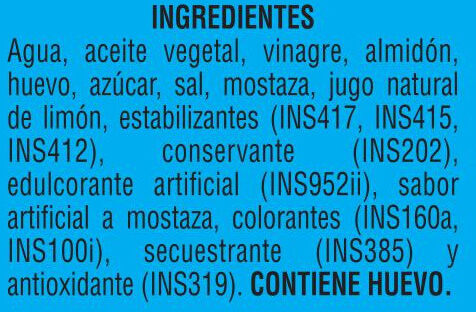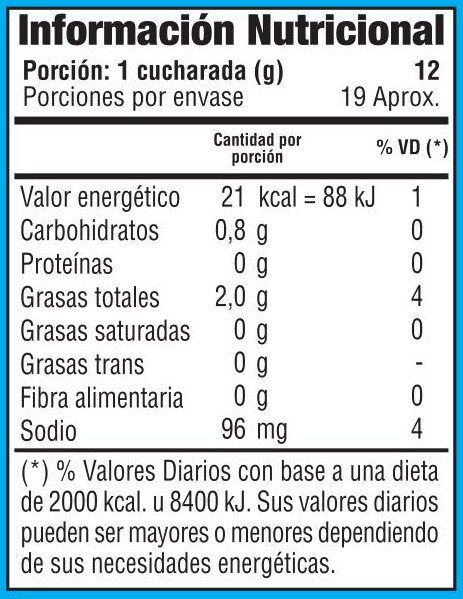Help us make food transparency the norm!
As a non-profit organization, we depend on your donations to continue informing consumers around the world about what they eat.
The food revolution starts with you!
Mayonesa Light - Nativo - 230 cm³ / 224 g
Mayonesa Light - Nativo - 230 cm³ / 224 g
Barcode: 7771214008511 (EAN / EAN-13)
Common name: alimento emulsionado.
Quantity: 230 cm³ / 224 g
Packaging: Plastic, Pouch flask
Categories: Condiments, Specific products, Products for specific diets, Products without gluten, Sauces, Mayonnaises, Light mayonnaises
Labels, certifications, awards:
No gluten, es:Sin TACC
Origin of ingredients: Bolivia
Manufacturing or processing places: Santa Cruz, Bolivia
Traceability code: 080103100001, RE 800328477/1, RE 8011146011/1
Link to the product page on the official site of the producer: https://www.grupovenado.com/
Stores: Venado
Matching with your preferences
Health
Ingredients
-
25 ingredients
: Agua, aceite vegetal, vinagre, almidón, huevo, azúcar, sal, mostaza, jugo de limón, estabilizantes (INS417, INS415, INS412), conservante (INS202), edulcorante artificial (INS952ii), sabor artificial a mostaza, colorantes (INS160a, INS100i), secuestrante (INS385), antioxidante (INS319).Allergens: Eggs, Mustard
Food processing
-
Ultra processed foods
Elements that indicate the product is in the 4 - Ultra processed food and drink products group:
- Additive: E160a - Carotene
- Additive: E412 - Guar gum
- Additive: E415 - Xanthan gum
- Additive: E417 - Tara gum
- Ingredient: Colour
- Ingredient: Sequestrant
Food products are classified into 4 groups according to their degree of processing:
- Unprocessed or minimally processed foods
- Processed culinary ingredients
- Processed foods
- Ultra processed foods
The determination of the group is based on the category of the product and on the ingredients it contains.
Additives
-
E160a - Carotene
Carotene: The term carotene -also carotin, from the Latin carota, "carrot"- is used for many related unsaturated hydrocarbon substances having the formula C40Hx, which are synthesized by plants but in general cannot be made by animals -with the exception of some aphids and spider mites which acquired the synthesizing genes from fungi-. Carotenes are photosynthetic pigments important for photosynthesis. Carotenes contain no oxygen atoms. They absorb ultraviolet, violet, and blue light and scatter orange or red light, and -in low concentrations- yellow light. Carotenes are responsible for the orange colour of the carrot, for which this class of chemicals is named, and for the colours of many other fruits, vegetables and fungi -for example, sweet potatoes, chanterelle and orange cantaloupe melon-. Carotenes are also responsible for the orange -but not all of the yellow- colours in dry foliage. They also -in lower concentrations- impart the yellow coloration to milk-fat and butter. Omnivorous animal species which are relatively poor converters of coloured dietary carotenoids to colourless retinoids have yellowed-coloured body fat, as a result of the carotenoid retention from the vegetable portion of their diet. The typical yellow-coloured fat of humans and chickens is a result of fat storage of carotenes from their diets. Carotenes contribute to photosynthesis by transmitting the light energy they absorb to chlorophyll. They also protect plant tissues by helping to absorb the energy from singlet oxygen, an excited form of the oxygen molecule O2 which is formed during photosynthesis. β-Carotene is composed of two retinyl groups, and is broken down in the mucosa of the human small intestine by β-carotene 15‚15'-monooxygenase to retinal, a form of vitamin A. β-Carotene can be stored in the liver and body fat and converted to retinal as needed, thus making it a form of vitamin A for humans and some other mammals. The carotenes α-carotene and γ-carotene, due to their single retinyl group -β-ionone ring-, also have some vitamin A activity -though less than β-carotene-, as does the xanthophyll carotenoid β-cryptoxanthin. All other carotenoids, including lycopene, have no beta-ring and thus no vitamin A activity -although they may have antioxidant activity and thus biological activity in other ways-. Animal species differ greatly in their ability to convert retinyl -beta-ionone- containing carotenoids to retinals. Carnivores in general are poor converters of dietary ionone-containing carotenoids. Pure carnivores such as ferrets lack β-carotene 15‚15'-monooxygenase and cannot convert any carotenoids to retinals at all -resulting in carotenes not being a form of vitamin A for this species-; while cats can convert a trace of β-carotene to retinol, although the amount is totally insufficient for meeting their daily retinol needs.Source: Wikipedia
-
E202 - Potassium sorbate
Potassium sorbate (E202) is a synthetic food preservative commonly used to extend the shelf life of various food products.
It works by inhibiting the growth of molds, yeast, and some bacteria, preventing spoilage. When added to foods, it helps maintain their freshness and quality.
Some studies have shown that when combined with nitrites, potassium sorbate have genotoxic activity in vitro. However, potassium sorbate is generally recognized as safe (GRAS) by regulatory authorities.
-
E319 - Tertiary-butylhydroquinone (tbhq)
Tert-Butylhydroquinone: tert-Butylhydroquinone -TBHQ, tertiary butylhydroquinone- is a synthetic aromatic organic compound which is a type of phenol. It is a derivative of hydroquinone, substituted with a tert-butyl group.Source: Wikipedia
-
E412 - Guar gum
Guar gum (E412) is a natural food additive derived from guar beans.
This white, odorless powder is valued for its remarkable thickening and stabilizing properties, making it a common ingredient in various food products, including sauces, dressings, and ice creams.
When used in moderation, guar gum is considered safe for consumption, with no known adverse health effects.
-
E415 - Xanthan gum
Xanthan gum (E415) is a natural polysaccharide derived from fermented sugars, often used in the food industry as a thickening and stabilizing agent.
This versatile food additive enhances texture and prevents ingredient separation in a wide range of products, including salad dressings, sauces, and gluten-free baked goods.
It is considered safe for consumption even at high intake amounts.
Ingredients analysis
-
May contain palm oil
Ingredients that may contain palm oil: Vegetable oil, E160a
-
Non-vegan
Non-vegan ingredients: EggSome ingredients could not be recognized.
We need your help!
You can help us recognize more ingredients and better analyze the list of ingredients for this product and others:
- Edit this product page to correct spelling mistakes in the ingredients list, and/or to remove ingredients in other languages and sentences that are not related to the ingredients.
- Add new entries, synonyms or translations to our multilingual lists of ingredients, ingredient processing methods, and labels.
If you would like to help, join the #ingredients channel on our Slack discussion space and/or learn about ingredients analysis on our wiki. Thank you!
-
Vegetarian status unknown
Unrecognized ingredients: Mustard, es:edulcorante-artificial, es:e952ii, es:sabor-artificial-a-mostaza, es:e100iSome ingredients could not be recognized.
We need your help!
You can help us recognize more ingredients and better analyze the list of ingredients for this product and others:
- Edit this product page to correct spelling mistakes in the ingredients list, and/or to remove ingredients in other languages and sentences that are not related to the ingredients.
- Add new entries, synonyms or translations to our multilingual lists of ingredients, ingredient processing methods, and labels.
If you would like to help, join the #ingredients channel on our Slack discussion space and/or learn about ingredients analysis on our wiki. Thank you!
-
Details of the analysis of the ingredients
We need your help!
Some ingredients could not be recognized.
We need your help!
You can help us recognize more ingredients and better analyze the list of ingredients for this product and others:
- Edit this product page to correct spelling mistakes in the ingredients list, and/or to remove ingredients in other languages and sentences that are not related to the ingredients.
- Add new entries, synonyms or translations to our multilingual lists of ingredients, ingredient processing methods, and labels.
If you would like to help, join the #ingredients channel on our Slack discussion space and/or learn about ingredients analysis on our wiki. Thank you!
: Agua, aceite vegetal, vinagre, almidón, huevo, azúcar, sal, mostaza, jugo de limón, estabilizantes (e417, e415, e412), conservante (e202), edulcorante artificial (e952ii), sabor artificial a mostaza, colorantes (e160a, e100i), secuestrante (e385), antioxidante (e319)- Agua -> en:water - vegan: yes - vegetarian: yes - ciqual_food_code: 18066 - percent_min: 6.25 - percent_max: 100
- aceite vegetal -> en:vegetable-oil - vegan: yes - vegetarian: yes - from_palm_oil: maybe - percent_min: 0 - percent_max: 50
- vinagre -> en:vinegar - vegan: yes - vegetarian: yes - ciqual_food_code: 11018 - percent_min: 0 - percent_max: 33.3333333333333
- almidón -> en:starch - vegan: yes - vegetarian: yes - ciqual_proxy_food_code: 9510 - percent_min: 0 - percent_max: 25
- huevo -> en:egg - vegan: no - vegetarian: yes - ciqual_food_code: 22000 - percent_min: 0 - percent_max: 20
- azúcar -> en:sugar - vegan: yes - vegetarian: yes - ciqual_proxy_food_code: 31016 - percent_min: 0 - percent_max: 16.6666666666667
- sal -> en:salt - vegan: yes - vegetarian: yes - ciqual_food_code: 11058 - percent_min: 0 - percent_max: 2
- mostaza -> en:mustard - ciqual_food_code: 11013 - percent_min: 0 - percent_max: 2
- jugo de limón -> en:lemon-juice - vegan: yes - vegetarian: yes - ciqual_food_code: 2028 - percent_min: 0 - percent_max: 2
- estabilizantes -> en:stabiliser - percent_min: 0 - percent_max: 2
- e417 -> en:e417 - vegan: yes - vegetarian: yes - percent_min: 0 - percent_max: 2
- e415 -> en:e415 - vegan: yes - vegetarian: yes - percent_min: 0 - percent_max: 1
- e412 -> en:e412 - vegan: yes - vegetarian: yes - percent_min: 0 - percent_max: 0.666666666666667
- conservante -> en:preservative - percent_min: 0 - percent_max: 2
- e202 -> en:e202 - vegan: yes - vegetarian: yes - percent_min: 0 - percent_max: 2
- edulcorante artificial -> es:edulcorante-artificial - percent_min: 0 - percent_max: 2
- e952ii -> es:e952ii - percent_min: 0 - percent_max: 2
- sabor artificial a mostaza -> es:sabor-artificial-a-mostaza - percent_min: 0 - percent_max: 2
- colorantes -> en:colour - percent_min: 0 - percent_max: 2
- e160a -> en:e160a - vegan: maybe - vegetarian: maybe - from_palm_oil: maybe - percent_min: 0 - percent_max: 2
- e100i -> es:e100i - percent_min: 0 - percent_max: 1
- secuestrante -> en:sequestrant - percent_min: 0 - percent_max: 2
- e385 -> en:e385 - vegan: yes - vegetarian: yes - percent_min: 0 - percent_max: 2
- antioxidante -> en:antioxidant - percent_min: 0 - percent_max: 2
- e319 -> en:e319 - vegan: yes - vegetarian: yes - percent_min: 0 - percent_max: 2
Nutrition
-
Missing data to compute the Nutri-Score
Missing nutrition facts
⚠ ️The nutrition facts of the product must be specified in order to compute the Nutri-Score.Could you add the information needed to compute the Nutri-Score? Add nutrition facts
-
Nutrient levels
-
Fat in moderate quantity (16.7%)
What you need to know- A high consumption of fat, especially saturated fats, can raise cholesterol, which increases the risk of heart diseases.
Recommendation: Limit the consumption of fat and saturated fat- Choose products with lower fat and saturated fat content.
-
Saturated fat in low quantity (0%)
What you need to know- A high consumption of fat, especially saturated fats, can raise cholesterol, which increases the risk of heart diseases.
Recommendation: Limit the consumption of fat and saturated fat- Choose products with lower fat and saturated fat content.
-
Salt in high quantity (2%)
What you need to know- A high consumption of salt (or sodium) can cause raised blood pressure, which can increase the risk of heart disease and stroke.
- Many people who have high blood pressure do not know it, as there are often no symptoms.
- Most people consume too much salt (on average 9 to 12 grams per day), around twice the recommended maximum level of intake.
Recommendation: Limit the consumption of salt and salted food- Reduce the quantity of salt used when cooking, and don't salt again at the table.
- Limit the consumption of salty snacks and choose products with lower salt content.
-
-
Nutrition facts
Nutrition facts As sold
for 100 g / 100 mlAs sold
per serving (1 cucharada 12 g)Compared to: Light mayonnaises Energy 733 kj
(175 kcal)88 kj
(21 kcal)-38% Fat 16.7 g 2 g -39% Saturated fat 0 g 0 g -100% Trans fat 0 g 0 g Carbohydrates 6.67 g 0.8 g -17% Sugars ? ? Fiber 0 g 0 g -100% Proteins 0 g 0 g -100% Salt 2 g 0.24 g +14% Fruits‚ vegetables‚ nuts and rapeseed‚ walnut and olive oils (estimate from ingredients list analysis) 0.183 % 0.183 %
Environment
-
Eco-Score D - High environmental impact
⚠ ️Select a country in order to include the full impact of transportation.The Eco-Score is an experimental score that summarizes the environmental impacts of food products.→ The Eco-Score was initially developped for France and it is being extended to other European countries. The Eco-Score formula is subject to change as it is regularly improved to make it more precise and better suited to each country.Life cycle analysis
-
Average impact of products of the same category: C (Score: 54/100)
Category: Mayonnaise, reduced fat or light mayonnaise
Category: Mayonnaise, reduced fat or light mayonnaise
- PEF environmental score: 0.50 (the lower the score, the lower the impact)
- including impact on climate change: 3.01 kg CO2 eq/kg of product
Stage Impact Agriculture
72.4 %Processing
13.6 %Packaging
5.3 %Transportation
6.3 %Distribution
1.9 %Consumption
0.5 %
Bonuses and maluses
-
Origins of ingredients with a high impact
Malus: -5
Environmental policy: -5
Transportation: 0
Origin of the product and/or its ingredients % of ingredients Impact Bolivia 100 %High
-
Missing packaging information for this product
Malus: -15
⚠ ️ The information about the packaging of this product is not filled in.⚠ ️ For a more precise calculation of the Eco-Score, you can modify the product page and add them.
If you are the manufacturer of this product, you can send us the information with our free platform for producers.
Eco-Score for this product
-
Impact for this product: D (Score: 34/100)
Product: Mayonesa Light - Nativo - 230 cm³ / 224 g
Life cycle analysis score: 54
Sum of bonuses and maluses: -20
Final score: 34/100
-
Carbon footprint
-
Equal to driving 1.6 km in a petrol car
301 g CO² per 100g of product
The carbon emission figure comes from ADEME's Agribalyse database, for the category: Mayonnaise, reduced fat or light mayonnaise (Source: ADEME Agribalyse Database)
Stage Impact Agriculture
65.3 %Processing
13.0 %Packaging
8.0 %Transportation
12.2 %Distribution
1.3 %Consumption
0.2 %
Packaging
-
Missing packaging information for this product
⚠ ️ The information about the packaging of this product is not filled in.Take a photo of the recycling information Take a photo of the recycling information
Transportation
-
Origins of ingredients
Origins of ingredients with a high impact
Origin of the product and/or its ingredients % of ingredients Impact Bolivia 100 %High
Report a problem
-
Incomplete or incorrect information?
Category, labels, ingredients, allergens, nutritional information, photos etc.
If the information does not match the information on the packaging, please complete or correct it. Open Food Facts is a collaborative database, and every contribution is useful for all.













